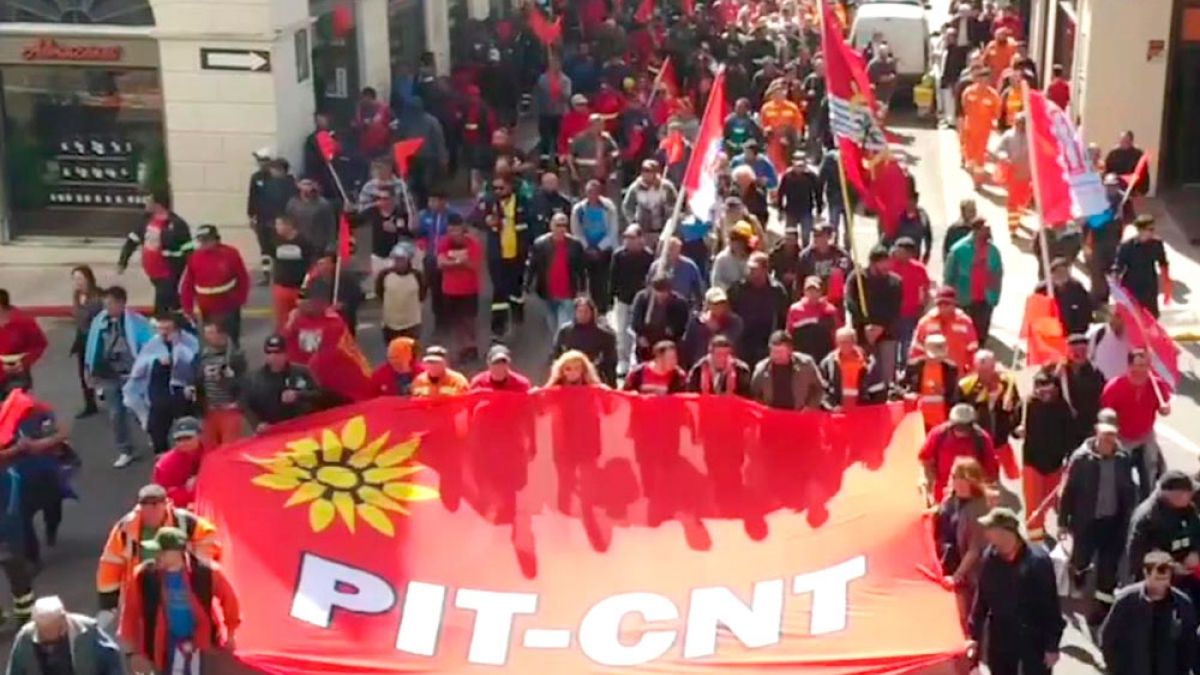In the first month of the government of Javier Mileithe Argentine president presented a Decree of Necessity and Urgency (DNU) and a project called Omnibus Law, both seek radical changes in the political, economic and constitutional structure of the neighboring country; Faced with this, the PIT-CNT announced his support for Argentine workers and decreed a mobilization that will take place this Wednesday at noon.
Last week, the union center announced the decision to hold a demonstration against the Argentine government’s measures and in support of the workers. From el PIT-CNT argue that “Argentine workers are immersed in a complex scenario marked by a succession of government measures that strongly affect the employment, the rights and the freedoms, criminalizing the protest and applying a savage adjustment that falls on the backs of the people.
“He Decree of Necessity and Urgency (DNU) and the Omnibus Law presented by President Milei, carry out a series of reforms that not only amount to a de facto constitutional reform, with minimal debate in the Congress, but they delegate enormous powers to the president, trampling democracy and the fundamental values of a rule of law,” the statement added.
In that sense, they also appealed to the reality that there are thousands of Uruguayans who live in the Argentina and that they will also be affected by the measures of Javier Milei. “The privatization of public companies, the disinvestment in education, the dismantling of public services, the criminalization of the protest and labour reform, are some of the gigantic negative impacts of these decisions,” the note details.
Highlighting the idea that the union center has a “long history of internationalist solidarity,” they established that a mobilization will be carried out with the objective of showing solidarity with Argentine unions and workers. The protest will take place on Wednesday in front of the Argentinian embassy in Montevideo at 1 p.m.
Like Montevideo, there are other cities that will present support for Argentine workers and against the measures of the recent Argentine president. Among them are the European cities of London, Berlin, Madrid and Paris.
Embed – https://publish.twitter.com/oembed?url=https://twitter.com/PITCNT1/status/1749529417410330795&partner=&hide_thread=false
WE MOBILIZE IN SOLIDARITY WITH OUR ARGENTINE SISTERS AND BROTHERS
1/24/24 · 1:00 p.m.
Argentine Embassy in Montevideo · Cuareim 1470PIT-CNT pic.twitter.com/4VByeNCtvJ
— PIT CNT (@PITCNT1) January 22, 2024
Milei faces his first general strike
The libertarian president Javier Milei On Wednesday, he will face a general strike called by Argentina’s largest union center, in the first major challenge to the economic reforms he undertook since he came to power a month and a half ago.
The General Confederation of Labor (CGT), with a Peronist orientation, rejects in particular the changes by decree of the labor regime promoted by Milei, which limit the right of strike and affect the financing of unions.
“No union is in a position to give up even an inch of what has been achieved,” he warned. Pablo Moyanoco-secretary general of the CGT, who also rejects the call “Omnibus Law“of cost reduction and deregulation of the economy that the Congress, where the ruling party is in the minority.
Also joining the call was the Confederation of Argentine Workers (CTA), second union center, as well as Mothers and Grandmothers of Plaza de Mayo.
The mega Decree of Necessity and Urgency (DNU) of 366 articles dictated by Milei As soon as he took office, he introduced several substantive changes to the old and consolidated Argentine labor legislation, particularly on the exercise of the right to strike.
Milei requires minimum coverage of 75% in essential services such as education, transportation and feeding, among others, and promotes dismissals for cause of strikers.
He DNU also regulates labor assemblies, conditions the collection of union funds and reduces compensation for dismissal.
The CGT questioned the constitutionality of the labor chapter of the megadecree before the court, which provisionally suspended its effects. The decision was appealed by the government and the case has already been elevated to the Supreme Courtcurrently on recess.
Source: Ambito




